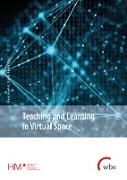Read more
When it comes to working and learning, collaboration is often the key to success. In a team, tasks can be completed more efficiently, complex issues are easier to grasp and, as we all know, learning is not only an individual but also a social process. The articles in this collection illustrate a variety of opportunities and challenges that the use of virtual spaces and virtual technologies presents for successful teamwork. The collections' aim is to contribute to exploratory research as well as pilot studies of concepts and methods in the use of virtuality, with contributions from different professional and application perspectives.
The question of whether teamwork will increasingly take place in virtual space in the future is clearly answered in the affirmative. For this reason, it is necessary to continue to investigate the organisation of virtual collaboration in the future and to continuously develop new concepts for collaboration. This publication is a snapshot of these ongoing developments. It is intended to inspire practitioners to innovate in the design of collaboration in work and learning environments and to stimulate researchers in their future experiments and research approaches.
List of contents
Editors' Introduction
Klaus Kreulich
Immersive Collaboration: Facilitating Good Teamwork
Christian Strobel
Psychological Aspects of Virtual Collaboration: A brief overview
Marion Rauscher
Let's Collaborate, Avatar: Competence Acquisition in Multi-User Virtual Reality Environments
Audrey Stolze
Virtual Collaboration as a "Future Skill" - Analysis of an Innovative Learning Scenario for a HEI of the Future
Sierk Horn & Miyuki Takino
Digital Negotiations Across Cultures
Andrés Rueda, Bettina Maisch
From Second Life to Second Job: Creativity and Entrepreneurship Education in the Metaverse
Markus Stäuble
Gamification for team motivation
Christina Schindler
Virtual Collaboration in a technical laboratory - an example from semiconductor technology
Christian Hanshans
(Virtual) Collaboration in Medicine and Biomedical Engineering
Student Postscript
About the author
Prof. Dr.-Ing. Klaus Kreulich ist Professor für Medienvorstufe sowie Vizepräsident für Lehre der Hochschule München. Er ist Experte und gefragter Redner zu Digitalisierungstrends der Medienindustrie.
Sibylle Matern ist Kommunikationswissenschaftlerin und wissenschaftliche Mitarbeiterin im Projekt "Virtuelle Kollaboration in der Arbeitswelt 4.0" an der Hochschule München.
Prof. Dr.-Ing. Klaus Kreulich is Professor of Premedia Technology and Vice President of Munich University of Applied Sciences HM. He is an expert and sought-after speaker on digitisation trends in the media industry.
Sibylle Matern is a communication scientist and a research associate in the project "Virtual Collaboration in the Working World 4.0" at Munich University of Applied Sciences HM.

